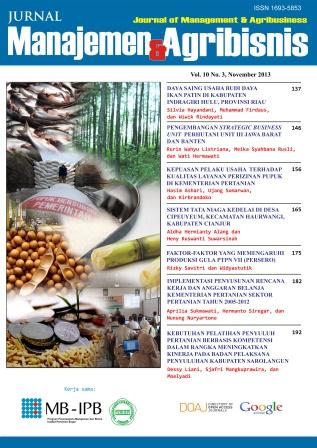IMPLEMENTASI PENYUSUNAN RENCANA KERJA DAN ANGGARAN BELANJA KEMENTERIAN PERTANIAN SEKTOR PERTANIAN TAHUN 2005-2012
Abstract
ABSTRACT
The research objectives were to 1) analyze the implementation suitability of RKA-K/L document preparation which is implemented by Ministry of Agriculture with the concept of unified budget, Performance Base Budgeting (PBB) and Medium Term Expenditure Framework (MTEF) by using gap analysis method and 2) analyze the influence of expenditure in research, development and agriculture extension program; agriculture infrastructure; and increasing of production and agricultural productivity program, as well as agricultural subsidies to Gross Domestic Product (GDP) growth through multiple regression analysis. The methods used were gap analysis and multiple regression analysis. Gap analysis shows that there are still some obstacles in the application of unified budget concept, PBK and KPJM which resulted partial gap with applicable regulations. Multiple regression analysis shows that the Ministry of Agriculture budget expenditure both agriculture research, development and extension programs also agricultural production and productivity program had significant negative effect on the growth of GDP in agriculture sector. Therefore the government needs to pay attention to the government budget allocation which is closely related to the implementation of the existing programs in the Ministry of Agriculture.
Keywords: government expenditure, sector of agriculture, ministry of agriculture, gap analysis, multiple regression analysis
ABSTRAK
Penelitian ini bertujuan 1) menganalisis kesesuaian dokumen Rencana Kerja dan Anggaran Kementerian Negara/Lembaga (RKAK/L) yang disusun oleh Kementerian Pertanian dengan konsep penganggaran terpadu, Penganggaran Berbasis Kinerja (PBK) dan Kerangka Pengeluaran Jangka Menengah (KPJM) serta 2) menganalisis pengaruh alokasi anggaran untuk program penelitian dan penyuluhan pertanian; program infrastruktur pertanian; program peningkatan produksi dan produktivitas pertanian; serta subsidi benih dan pupuk terhadap pertumbuhan PDB. Metode analisis yang digunakan adalah analisis gap dan analisis regresi berganda. Hasil analisis gap menunjukkan bahwa masih ada beberapa kendala dalam penerapan konsep penganggaran terpadu, PBK dan KPJM yang mengakibatkan kesenjangan parsial dengan ketentuan yang berlaku, sedangkan hasil analisis regresi berganda menunjukkan bahwa alokasi anggaran Kementerian Pertanian untuk program penelitian pertanian, pengembangan dan penyuluhan serta program peningkatan produksi dan produktivitas pertanian berpengaruh negatif secara signifikan terhadap pertumbuhan PDB di sektor pertanian. Jadi pemerintah perlu memperhatikan alokasi anggaran pemerintah yang terkait erat dengan pelaksanaan program yang ada di Kementerian Pertanian.
Kata kunci: anggaran belanja, sektor pertanian, kementerian pertanian, analisis gap, regresi berganda
The research objectives were to 1) analyze the implementation suitability of RKA-K/L document preparation which is implemented by Ministry of Agriculture with the concept of unified budget, Performance Base Budgeting (PBB) and Medium Term Expenditure Framework (MTEF) by using gap analysis method and 2) analyze the influence of expenditure in research, development and agriculture extension program; agriculture infrastructure; and increasing of production and agricultural productivity program, as well as agricultural subsidies to Gross Domestic Product (GDP) growth through multiple regression analysis. The methods used were gap analysis and multiple regression analysis. Gap analysis shows that there are still some obstacles in the application of unified budget concept, PBK and KPJM which resulted partial gap with applicable regulations. Multiple regression analysis shows that the Ministry of Agriculture budget expenditure both agriculture research, development and extension programs also agricultural production and productivity program had significant negative effect on the growth of GDP in agriculture sector. Therefore the government needs to pay attention to the government budget allocation which is closely related to the implementation of the existing programs in the Ministry of Agriculture.
Keywords: government expenditure, sector of agriculture, ministry of agriculture, gap analysis, multiple regression analysis
ABSTRAK
Penelitian ini bertujuan 1) menganalisis kesesuaian dokumen Rencana Kerja dan Anggaran Kementerian Negara/Lembaga (RKAK/L) yang disusun oleh Kementerian Pertanian dengan konsep penganggaran terpadu, Penganggaran Berbasis Kinerja (PBK) dan Kerangka Pengeluaran Jangka Menengah (KPJM) serta 2) menganalisis pengaruh alokasi anggaran untuk program penelitian dan penyuluhan pertanian; program infrastruktur pertanian; program peningkatan produksi dan produktivitas pertanian; serta subsidi benih dan pupuk terhadap pertumbuhan PDB. Metode analisis yang digunakan adalah analisis gap dan analisis regresi berganda. Hasil analisis gap menunjukkan bahwa masih ada beberapa kendala dalam penerapan konsep penganggaran terpadu, PBK dan KPJM yang mengakibatkan kesenjangan parsial dengan ketentuan yang berlaku, sedangkan hasil analisis regresi berganda menunjukkan bahwa alokasi anggaran Kementerian Pertanian untuk program penelitian pertanian, pengembangan dan penyuluhan serta program peningkatan produksi dan produktivitas pertanian berpengaruh negatif secara signifikan terhadap pertumbuhan PDB di sektor pertanian. Jadi pemerintah perlu memperhatikan alokasi anggaran pemerintah yang terkait erat dengan pelaksanaan program yang ada di Kementerian Pertanian.
Kata kunci: anggaran belanja, sektor pertanian, kementerian pertanian, analisis gap, regresi berganda
Authors
SukmawatiA., SiregarH., & NuryartonoN. (2014). IMPLEMENTASI PENYUSUNAN RENCANA KERJA DAN ANGGARAN BELANJA KEMENTERIAN PERTANIAN SEKTOR PERTANIAN TAHUN 2005-2012. Jurnal Manajemen & Agribisnis, 10(3), 182-191. https://doi.org/10.17358/jma.10.3.182-191
Authors who publish with this journal agree to the following terms:
- Authors retain copyright and grant the journal right of first publication with the work simultaneously licensed under a Creative Commons Attribution License that allows others to share the work with an acknowledgement of the work's authorship and initial publication in this journal.
- Authors are able to enter into separate, additional contractual arrangements for the non-exclusive distribution of the journal's published version of the work (e.g., post it to an institutional repository or publish it in a book), with an acknowledgement of its initial publication in this journal.
- Authors are permitted and encouraged to post their work online (e.g., in institutional repositories or on their website) prior to and during the submission process, as it can lead to productive exchanges, as well as earlier and greater citation of published work (See The Effect of Open Access).

